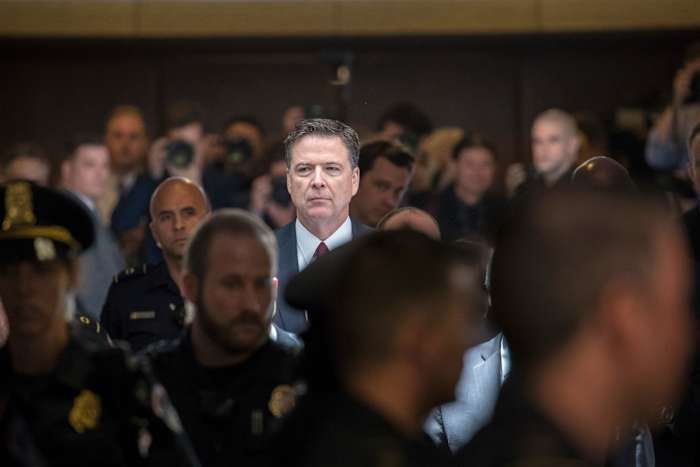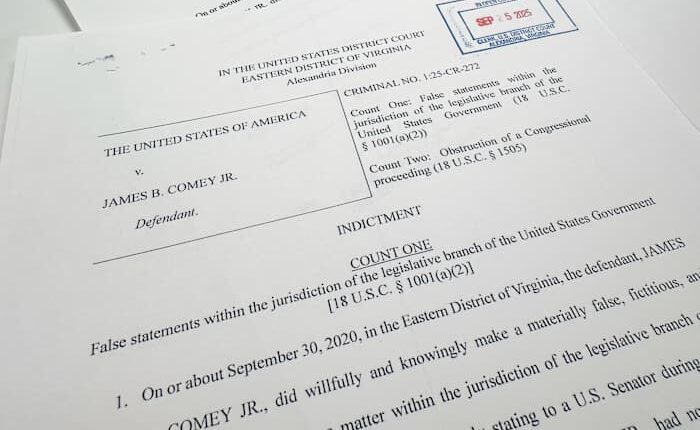Share this @internewscast.com

WASHINGTON – Former FBI Director James Comey has been indicted, marking the first criminal case involving someone viewed as an opponent of President Donald Trump during this administration. This move aligns with Trump’s public calls for the Justice Department to prosecute his adversaries.
The legal case focuses on an alleged false statement Comey made to Congress five years ago. However, it is also the latest development in a tumultuous relationship with Trump, marked by public animosity that escalated when Trump dismissed Comey amid an intensifying FBI probe into his 2016 presidential campaign.
Since then, there have been exchanges of insults, the revelation of confidential memos, a sharply critical memoir from Comey, and Trump’s demands for vengeance against those like Comey whom he believes have wronged him.
A look at the allegations in Thursday’s indictment, as well as at the history of the Trump/Comey relationship:
What’s the backstory?
Comey was FBI director when Trump was inaugurated in January 2017. Comey had been nominated nearly four years earlier by President Barack Obama.
This period saw the FBI deeply embroiled in U.S. political issues, as Comey faced backlash over his management of the investigation into Democratic candidate Hillary Clinton’s use of a private email server, while also handling a separate probe into connections between Russia and Trump’s victorious 2016 campaign.
The relationship was tense from the outset, with Trump being briefed by Comey on controversial and unverified claims in a dossier assembled by a former British intelligence officer, weeks before Trump assumed office.
In the initial private meetings, according to Comey, Trump requested loyalty from his FBI director and urged him to drop an investigation into Michael Flynn, the administration’s first national security adviser. Trump also wanted Comey to assert publicly that Trump was not personally under investigation in the broader Russian election interference inquiry, a request Comey chose to ignore.
Comey was abruptly fired in May 2017 while at an event in Los Angeles, with Trump later saying that he was thinking about “the Russia thing” when he decided to terminate him. The firing was investigated by Justice Department special counsel Robert Mueller as an act of potential obstruction of justice.
What’s happened since then?
The firing hardly removed Comey from public view.
A week after being terminated, Comey shared with a close friend a contemporaneous memo of an Oval Office conversation with Trump that he said unnerved him and authorized the friend to describe its contents to a reporter. The full batch of memos that Comey surreptitiously maintained while working for Trump was subsequently released by Congress.
Comey in 2018 published a memoir, “A Higher Loyalty,” that painted Trump in deeply unflattering ways, likening him to a mafia don and characterizing him as unethical and “untethered to truth.”
Trump, for his part, continued to angrily vent at Comey as the Russia investigation led by Mueller dominated headlines for the next two years and shadowed his first administration. On social media, he repeatedly claimed that Comey should face charges for “treason” — an accusation Comey dismissed as “dumb lies” — and called him an “untruthful slime ball.”
Since leaving the FBI, Comey and his decision-making have been carefully scrutinized as part of multiple government investigations. That includes a harshly critical inspector general report examining his handling of the memos he kept of conversations with Trump. But until now, no prosecutor has pressed forward with any criminal case against Comey or any other senior government official in connection with the Russia saga.
What the indictment alleges
Of note, the sparse two-count indictment — consisting of charges of making a false statement to the Senate Judiciary Committee and obstructing a congressional proceeding — appears to have nothing to do with the substance of the Russia investigation.
Instead, it accuses Comey of having lied to the committee when asked whether he had authorized anyone else at the FBI to be an anonymous source of information related to investigations into either Trump or Clinton. Though the indictment does not specify the subject Comey is alleged to have lied about, it appears through context to have to do with Clinton.
Comey, in a video he posted after his indictment, said: “My heart is broken for the Department of Justice but I have great confidence in the federal judicial system, and I’m innocent. So let’s have a trial.”
Copyright 2025 The Associated Press. All rights reserved. This material may not be published, broadcast, rewritten or redistributed without permission.











